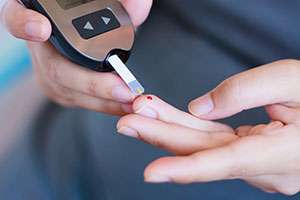
Pancreatic cancer can cause nutritional challenges long after treatment is over.
Editor’s note: Each week, the Pancreatic Cancer Action Network’s (PanCAN) Friday Fix blog series covers topics related to diet, nutrition, health and wellness, which can be especially useful for pancreatic cancer patients and caregivers. Check out previous Friday Fix articles, and if you have a topic you’d like us to write about in the future, please leave it in the comments section below.
Regardless of your current or past treatment, long-term nutritional challenges may follow a pancreatic cancer diagnosis.
While some of the nutritional challenges that come with pancreatic cancer and its treatment go away after a recovery period, others may linger. Addressing these symptoms may be possible and can help improve your quality of life.
Here, we explore two major challenges survivors commonly face in the long term – diabetes and pancreatic enzyme insufficiency – and what to do about them.
Enzyme Insufficiency and Malabsorption
The pancreas makes enzymes that help you digest food.
Pancreatic cancer and its treatment often cause the pancreas to not make enough enzymes, called enzyme insufficiency. And sometimes a blockage can also prevent enzymes from mixing with food. When there are not enough enzymes to properly digest food, the body cannot use all of the nutrients in food, which is called malabsorption.
These result in symptoms like gas, diarrhea and weight loss. Taking pancreatic enzyme supplements correctly often relieves symptoms caused by enzyme insufficiency and malabsorption.
Some patients will need to take enzymes for life. Others may only need them for a short period of time.
Patients may also need different doses or brands of enzymes throughout their treatment and care.
It’s important to talk to your healthcare team about enzyme use at regular visits, including:
- Any symptoms you still have
- The right type of enzymes to take
- The right enzyme dose
- Whether you should keep taking enzymes
“Make sure you always talk to your medical team before you stop taking enzymes,” notes Katrina Claghorn, registered dietitian nutritionist with 25 years of experience in oncology nutrition, specializing in pancreatic cancer and other gastrointestinal (GI) cancers. “I can’t tell you the number of times patients just stopped cold turkey and forgot to mention that until we picked up on it when they lost weight.”
Diabetes

Diabetes can be a long-term challenge for pancreatic cancer survivors.
People with pancreatic cancer are also at risk for diabetes.
The pancreas makes insulin, a hormone that helps the body use glucose (sugar) efficiently.
When someone has a tumor on their pancreas, or when part of the pancreas is removed through surgery, the pancreas may not function properly. If it does not make enough insulin, or the amount created is not effective, diabetes can arise.
Diabetes can cause major health problems. To control blood sugar levels, people with diabetes may need changes in diet and, sometimes, insulin therapy.
Those with diabetes may be advised to eat:
- Foods with complex carbohydrates, such as starch and fiber, instead of refined versions, such as white breads or pastries
- High-protein foods
- Small amounts of healthy fat with each meal and snack
- Foods from each food group: whole grains, fruits and vegetables, fat, protein
It’s important to talk to a registered dietitian who has experience with both diabetes and cancer to figure out what dietary changes you need.
Claghorn notes, “If your blood sugars are high, you may be told to ‘watch’ your carbohydrate intake. But this can be confusing. We also don’t want you to lose weight.
“A registered dietitian can determine how many carbs you need, help you choose the right carbs and teach you about the foods that don’t affect your blood sugars as much.”
Working with a Dietitian and Adjusting Your Diet
Good nutritional care improves outcomes and is critical for quality of life. PanCAN recommends that patients see a registered dietitian who has experience working with cancer patients.
These specialists can help answer questions and work with patients to meet their individual dietary needs.
“A lot of patients experience GI symptoms – gas, bloating, early satiety (feeling full) – that limit their ability to eat,” says Claghorn. “We always think enzyme insufficiency, but some problems are related to surgery and treatment.
“I always encourage patients to discuss all GI problems with their healthcare team, because many of them can be managed.”
Every patient is different, and what you need and what foods work for you will be very individual. It may take some trial and error, and what works may also change over time.
“Just do the best you can,” Claghorn advises. “Learning which foods are tolerated and improving your diet take time. You need to learn new dietary habits.”
And if symptoms continue or come back later, make sure to check in with your healthcare team – including your dietitian. There may be solutions.















